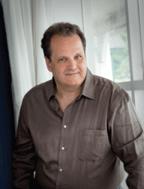
Poet Alan Toltzis, Rabbi Herbert Mandl’s brother-in-law, will be speaking at several venues in the Kansas City area Jan. 21-23.
Although Rabbi Mandl and his wife Barbara have Toltzis’ book, they’ve never seen him give a poetry reading, so they’re very excited.
“This is a second career for him,” the rabbi said. “He’s always been interested in poetry but it started a year or so ago when he took early retirement. He’s never been in Kansas City for anything professional; it’s always been personal.”
Rabbi Mandl said it’s unusual to be able to pursue a second career that becomes serious after retirement.
Among other venues, Toltzis will conduct what he calls the Psalm Project at Hyman Brand Hebrew Academy. Based on the Old Testament, it’s a way to help children understand the psalms by reading some of them. Toltzis provides his own translations, which are pretty close to the original.
“But I’m making some modifications and updating them a little bit to have a better understanding of them, then showing how King David used the same technique in writing his psalms that poets today use,” he said. “We’ll look at a few examples of modern poetry and then the kids can write their own.
“I’ve done this at a few different schools and it’s been very successful. They get right into it and whatever barrier there is between where they are today and children who lived 3,000 years ago quickly disappears.”
Toltzis is Jewish and much of his poetry is drawn from the Torah, but he says they are not traditionally religious poems.
“They’re not a retelling of the Torah, but they’re inspired by meditating on the story, the events, particular words, sometimes even one single letter. And I use that to get to the writing that I do,” he said.
Being Jewish does not influence Toltzis’ poetry. It’s all about connecting the reader to what he’s feeling and thinking. His poems work for any reader whether they can connect them to their original source or not because his subjects and images are about everyday things.
“I have one poem that starts with the line, ‘I want to be a poet of the ordinary, meditate on moonlight, errands and shoelaces,’ ” he said. “And that’s important because when you’re a working poet writing on a daily basis, you can’t just wait for inspiration to come to you. You have to attach meaning and significance to the events of everyday life.
“So what I write about can be meaningful to anybody; it has nothing to do with religion. For me, the source, the place where I start, is just a way for me to begin.”
Toltzis, 61, became interested in poetry in college. He took a course in modern poetry, followed by some creative writing courses. Then he let it go for many years while he founded two pharmaceutical advertising agencies. During that time, however, he read intensely. He says writing is important, but perhaps reading is even more important.
Now a consultant on strategic marketing business issues for pharmaceutical and medical device companies, Toltzis is back to writing the poetry he loves.
“I am good with language and I am in touch with my feelings and I’m good at getting to the language and images to connect me with the reader, and that allows me to write poetry,” he explained.
His philosophy on poetry applies to any genre: ideas come quickly, but getting the language right, getting the images right and having them expressed in the most efficient way is where the work comes. However, “poetry requires a more condensed language and more exact language than any other form of writing.”
As for people who say they don’t understand poetry, Toltzis says you can understand it at a lot of different levels. “The more you explore it and the more you read it and the more connections you can make, the more it reveals about itself. When you read a story you can just get the superficial storyline or you can get all the nuances.”
He says people who attend synagogues or churches don’t realize the service is replete with poetry — psalms and various readings from the Bible, whether in English or Hebrew — they recite poems frequently. “So I think people have more of a connection with poetry and poetic language than they might be aware of.”
Toltzis’ book, “The Last Commandment,” was inspired by a family vacation in Paris. Visiting the Jewish quarter, they stumbled onto a synagogue that was completing the writing of a Torah. The title of the book is from the last commandment in the Torah — writing the Torah for yourself.
He says there are many interpretations as to how to fulfill this commandment: one is to write a single letter as part of the Torah, another is to own sacred books.
“But I didn’t find any of those particularly satisfying,” he said. “What I do know is that right after that commandment is given in the book of Deuteronomy, what Moses does is write a very, very long beautiful poem. So that was the inspiration for the book.”
Each poem is based on one of the 54 weekly Torah portions. He’s now working on a second book based on Kabballah, or Jewish mysticism.
Poet Alan Toltzis schedule:
“From Sacred Texts to Poetry,” 6-7 p.m. Thursday, Jan. 21, Rockhurst University, Arrupe Hall 312, 1100 Rockhurst Road, Kansas City, MO. Discussion and reading.
The Psalm Project, during the school day, Friday, Jan. 22, Hyman Brand Hebrew Academy, 5801 W. 115th St., Overland Park, KS. Poetry workshop for middle and upper schools.
Caviar Speaker Series, Lunch and Learn, noon, Saturday, Jan. 23, Kehilath Israel Synagogue, 10501 Conser, Overland Park, KS. Readings and discussion of Toltzis’ new book, “The Last Commandment.”



